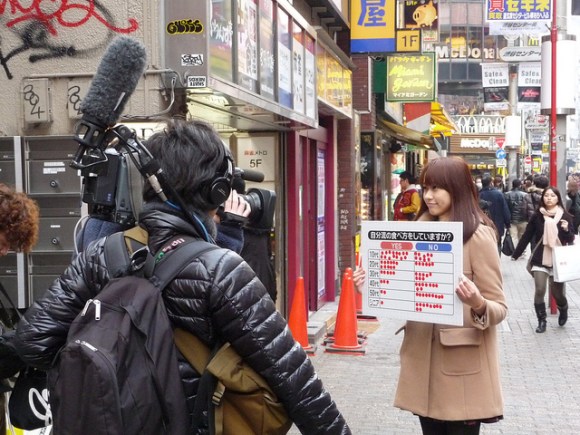
Don’t be influenced by the common myth that Japanese TV is awful – once you’re familiar with what’s going on, it becomes a whole lot more loveable.
It is common knowledge in the expat community in Japan that Japanese TV is awful. But what if this notion was a fallacy? A self-perpetuated myth? What if I told you it can be more enjoyable than Western TV?
I understand why foreigners are inclined to hate on Japanese TV, even as an avid Japanese TV lover for the past couple of decades, it can get on my nerves at times. However, I would argue that Japanese TV is like a fine wine, it gets better with age — but if you leave it too long it can start to smell a bit rancid.
▼Japanese actor and comedian Beat Takeshi on a “variety show”
Often after a break from Japanese TV, I find myself getting frustrated at the silly catch phrases and over-exaggerations. But after a couple of hours of viewing, this feeling seems to dissipate and I start to enjoy these haphazardly calculated attempts at entertainment and humour.
The bottom line is you have to give it an objective chance – don’t just listen to others who have given up on Japanese TV and have given it the gaijin disapproval stamp of “utter rubbish” – perhaps many of these people never actually gave it a fair go.
“But why bother?” I hear you ask. Well for one, it is fantastic for Japanese language practice, both listening and reading, with subtitles often being displayed on screen. And secondly, you can learn a lot about Japanese culture, news, current events, and humour – a lot of which may have gone over your head at the izakaya last night and you didn’t even know it!
▼ The izakaya, where beer and jokes are served in equal portion!
So what’s the key?
Familiarity.
Both familiarity with the format and perhaps more importantly familiarity with the people on TV. I’ve avoided the term celebrity or “talent” here, since these words, like Japanese TV itself, can have a bad stigma associated with them. But there is a misconception that the people on TV are just hacks that shot to stardom from doing stupid things or acting all crazy-like. Well, this is true for some – but these are the people that don’t hang around very long and “kieru” (disappear) from the screens.
Many TV celebrities have had to work hard for their status (of course, there are some that have come from privileged families already famous or in the industry but that goes for any country), especially comedians, who, personally, I find the most entertaining.
Far from just doing stupid things like rolling in gallons of lubricant or navigating insane obstacle courses, the large majority of comedians had to work hard – damn hard – to get on mainstream TV, often doing years and years of stand up comedy at small, very low-paying events. You will regularly hear of amateur and semi-professional comedians working several menial part-time jobs for decades just to keep up their dream of making it on TV alive.
▼Playing novelty size “kingyo suki” (scooping goldfish)
Often these people know they have to do outrageous things just to get noticed, which is why many of the new comedians seem so ridiculous. However, if they aren’t inherently funny or don’t have some kind of charm or charisma, they soon disappear from the screens.
There are many misconceptions about Japanese TV that have also fuelled the hate. Possibly the most prevalent is that the celebrities on the quiz shows or game shows are actually trying to win. Sometimes they are actually trying their hardest to win, but it depends on the contestant and it depends on the game. Very often a comedian will sacrifice a correct answer or victory for a laugh. Again, once you are familiar with the characters and shows this will become clear and the show will be infinitely more enjoyable to watch.
The more you watch the more you will notice patterns of jokes that begin to emerge. I have found that the relationships between celebrities is a lot more intricate than on Western TV – this feeling of almost family between everyone who appears on TV (also known as the “geinokai”, roughly translated as “the celebrity world”) allows for more interesting viewing as they are more curt with one another and able to engage in intimate banter. The staple ingredient of Japanese comedy is the ‘boke’ (silly) and ‘tsukkomi’ (serious) comedic framework. This comedy arrangement is understood between all celebrities and often makes for interesting interactions. This is why you will see people hitting (or pretending to hit) each other on the head all the time – the classic gesture of the “serious” comedian chastising the “silly” comedian.
▼Comedic Duo Ameagari Kesshitai
As for food programs, well I guess I can’t really defend the over-exaggeration of “delicious” comments. In the end you just have to judge how delicious or not delicious the food is by the sincerity in their eyes. And, for what it’s worth,I have actually seen someone say some food is “mazui” (awful), but probably only twice in 20 years. Of course Japanese TV isn’t perfect, but I’ve seen many cuisine shows on Western TV that are guilty of the same reaction repetition. Once again, the key is familiarity. Once you have an idea of who these “delicious” people are, you will have a greater appreciation of where they are coming from.
So what have you got to lose? Give Japanese TV a chance! Who knows, you may even end up loving it like me – and then next time when someone tells you they love natto, you can tell them you love Japanese TV.
Images: Flickr/gonme, Flickr/gilgongo, Flickr/Yuya Tamai, Flickr/st3f4n, Flickr/tree village

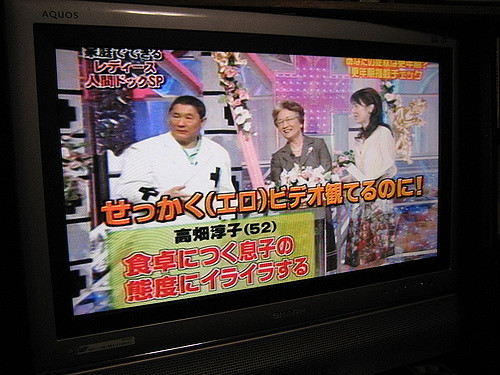
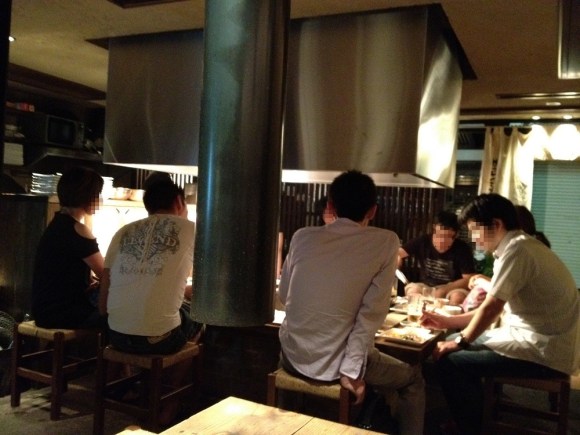
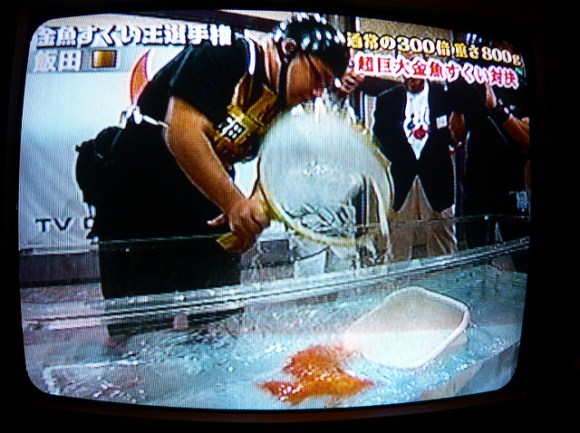
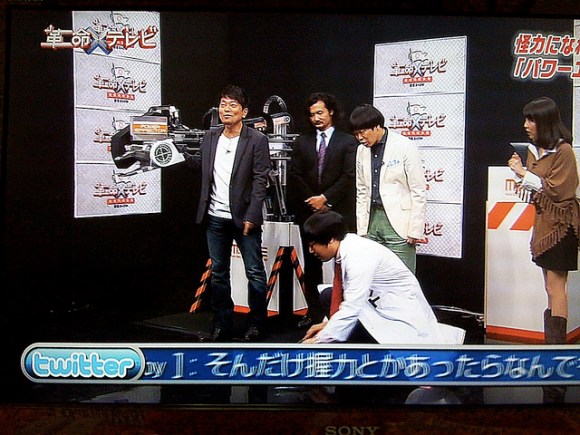
 Is Japanese TV really as bad as its reputation?
Is Japanese TV really as bad as its reputation? Japanese comedian baffles, amazes judges on America’s Got Talent with weird dance, Japanese humor
Japanese comedian baffles, amazes judges on America’s Got Talent with weird dance, Japanese humor Canadian learns to speak proper Japanese by becoming comedian, pouring tea for his master
Canadian learns to speak proper Japanese by becoming comedian, pouring tea for his master Terrace House funnyman Ryota Yamasato now married to Japanese actress Yu Aoi
Terrace House funnyman Ryota Yamasato now married to Japanese actress Yu Aoi Talk show features machine repeatedly slapping man in the nuts, because Japan
Talk show features machine repeatedly slapping man in the nuts, because Japan Tokyo Skytree turns pink for the cherry blossom season
Tokyo Skytree turns pink for the cherry blossom season Survey finds that one in five high schoolers don’t know who music legend Masaharu Fukuyama is
Survey finds that one in five high schoolers don’t know who music legend Masaharu Fukuyama is 566 million yen in gold bars donated to Japanese city’s water bureau
566 million yen in gold bars donated to Japanese city’s water bureau Highest Starbucks in Japan set to open this spring in the Tokyo sky
Highest Starbucks in Japan set to open this spring in the Tokyo sky Racing into our stomachs this winter are motorcycle fuel tank-shaped bento
Racing into our stomachs this winter are motorcycle fuel tank-shaped bento We visit the only shrine in Japan where you can pray to the gods for good weather
We visit the only shrine in Japan where you can pray to the gods for good weather Yakuzen ramen restaurant in Tokyo is very different to a yakuza ramen restaurant
Yakuzen ramen restaurant in Tokyo is very different to a yakuza ramen restaurant The best Japanese cosplayers from day two of Winter Comiket 2018【Photos】
The best Japanese cosplayers from day two of Winter Comiket 2018【Photos】 We try “Bubble Soccer,” body slam and laugh the entire time
We try “Bubble Soccer,” body slam and laugh the entire time Saitama is home to the best strawberries in Japan that you’ve probably never even heard of
Saitama is home to the best strawberries in Japan that you’ve probably never even heard of The 10 most annoying things foreign tourists do on Japanese trains, according to locals
The 10 most annoying things foreign tourists do on Japanese trains, according to locals Starbucks Japan releases new sakura goods and drinkware for cherry blossom season 2026
Starbucks Japan releases new sakura goods and drinkware for cherry blossom season 2026 Naruto and Converse team up for new line of shinobi sneakers[Photos]
Naruto and Converse team up for new line of shinobi sneakers[Photos] Is Sapporio’s Snow Festival awesome enough to be worth visiting even if you hate the snow? [Pics]
Is Sapporio’s Snow Festival awesome enough to be worth visiting even if you hate the snow? [Pics] Japan has trams that say “sorry” while they ride around town…but why?
Japan has trams that say “sorry” while they ride around town…but why? Sakura Totoro is here to get spring started early with adorable pouches and plushies
Sakura Totoro is here to get spring started early with adorable pouches and plushies Starbucks Japan unveils new sakura Frappuccino for cherry blossom season 2026
Starbucks Japan unveils new sakura Frappuccino for cherry blossom season 2026 Poop is in full bloom at the Unko Museums for cherry blossom season
Poop is in full bloom at the Unko Museums for cherry blossom season Now is the time to visit one of Tokyo’s best off-the-beaten-path plum blossom gardens
Now is the time to visit one of Tokyo’s best off-the-beaten-path plum blossom gardens Playing Switch 2 games with just one hand is possible thanks to Japanese peripheral maker
Playing Switch 2 games with just one hand is possible thanks to Japanese peripheral maker Japan’s newest Shinkansen has no seats…or passengers [Video]
Japan’s newest Shinkansen has no seats…or passengers [Video] Foreigners accounting for over 80 percent of off-course skiers needing rescue in Japan’s Hokkaido
Foreigners accounting for over 80 percent of off-course skiers needing rescue in Japan’s Hokkaido Super-salty pizza sends six kids to the hospital in Japan, linguistics blamed
Super-salty pizza sends six kids to the hospital in Japan, linguistics blamed Foreign tourists in Japan will get free Shinkansen tickets to promote regional tourism
Foreign tourists in Japan will get free Shinkansen tickets to promote regional tourism Take a trip to Japan’s Dododo Land, the most irritating place on Earth
Take a trip to Japan’s Dododo Land, the most irritating place on Earth Archfiend Hello Kitty appears as Sanrio launches new team-up with Yu-Gi-Oh【Pics】
Archfiend Hello Kitty appears as Sanrio launches new team-up with Yu-Gi-Oh【Pics】 Survey asks foreign tourists what bothered them in Japan, more than half gave same answer
Survey asks foreign tourists what bothered them in Japan, more than half gave same answer Japan’s human washing machines will go on sale to general public, demos to be held in Tokyo
Japan’s human washing machines will go on sale to general public, demos to be held in Tokyo Starbucks Japan releases new drinkware and goods for Valentine’s Day
Starbucks Japan releases new drinkware and goods for Valentine’s Day We deeply regret going into this tunnel on our walk in the mountains of Japan
We deeply regret going into this tunnel on our walk in the mountains of Japan Studio Ghibli releases Kodama forest spirits from Princess Mononoke to light up your home
Studio Ghibli releases Kodama forest spirits from Princess Mononoke to light up your home Major Japanese hotel chain says reservations via overseas booking sites may not be valid
Major Japanese hotel chain says reservations via overseas booking sites may not be valid Put sesame oil in your coffee? Japanese maker says it’s the best way to start your day【Taste test】
Put sesame oil in your coffee? Japanese maker says it’s the best way to start your day【Taste test】 No more using real katana for tourism activities, Japan’s National Police Agency says
No more using real katana for tourism activities, Japan’s National Police Agency says Japanese comedian dies after coronavirus infection
Japanese comedian dies after coronavirus infection Last One Standing brings an entirely new kind of Japanese crime comedy to Netflix
Last One Standing brings an entirely new kind of Japanese crime comedy to Netflix Foreigner delights Japanese netizens with hilarious video about Japanese washlet toilets
Foreigner delights Japanese netizens with hilarious video about Japanese washlet toilets This new celebrity catchphrase clapping game is all the rage in Japanese schools【Videos】
This new celebrity catchphrase clapping game is all the rage in Japanese schools【Videos】 Comedian Atsugiri Jason irks Japanese net users with offhand comment
Comedian Atsugiri Jason irks Japanese net users with offhand comment Japanese comedian parodies Trump, instructs noodle-loving Kyotoites to “Get out of here!”【Video】
Japanese comedian parodies Trump, instructs noodle-loving Kyotoites to “Get out of here!”【Video】 Japanese comedian shares hilarious “magical poses” that make you look like you’re naked【Video】
Japanese comedian shares hilarious “magical poses” that make you look like you’re naked【Video】 Japan’s Got Talent is coming to screens in 2023 with legendary Japanese comedian as judge
Japan’s Got Talent is coming to screens in 2023 with legendary Japanese comedian as judge Super Mega Important Debate – Japanese TV: is it just plain awful? 【Poll】
Super Mega Important Debate – Japanese TV: is it just plain awful? 【Poll】 Naomi Osaka called “too tanned” in Japanese comedy routine
Naomi Osaka called “too tanned” in Japanese comedy routine Naomi Osaka hits back at Japanese comedians’ “too sunburned” comment
Naomi Osaka hits back at Japanese comedians’ “too sunburned” comment “Do honky” command Japanese TV show’s T-shirts
“Do honky” command Japanese TV show’s T-shirts Foreign comedian Atsugiri Jason’s hot take on Japan’s apology culture has netizens abuzz
Foreign comedian Atsugiri Jason’s hot take on Japan’s apology culture has netizens abuzz 40 ways foreign and Japanese TV dramas are different, according to our Japanese-language reporter
40 ways foreign and Japanese TV dramas are different, according to our Japanese-language reporter Tech FAIL – Japanese man uses butter to try and turn his normal TV into a 3-D TV
Tech FAIL – Japanese man uses butter to try and turn his normal TV into a 3-D TV